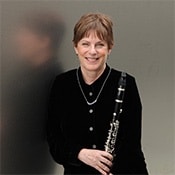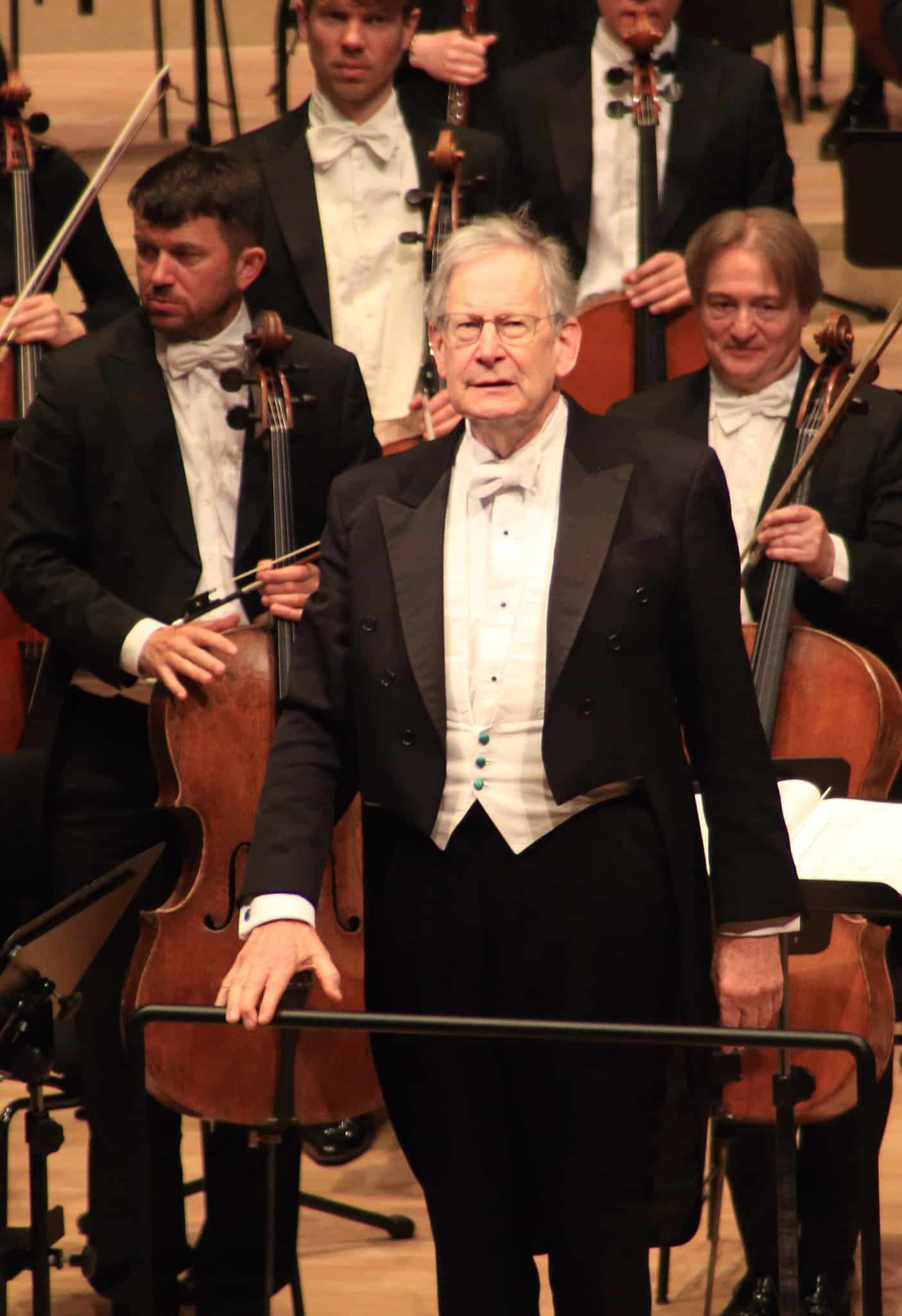‘Don’t bother,’ I told the conductor, ‘you’re not coming back’
mainThe wonderful Michele Zukofsky, who retired yesterday after 54 years as principal clarinet of the Los Angeles Philharmonic, has been sharing further reminiscences in a second instalment of her conversation with C K Dexter Haven.
Don’t try to identify the young German conductor she bawled out. There are many more nuggets to be found in her unbuttoned chat. Click here to read.






Awesome! She is the BEST!
C.T….the German conductor?Mrs.Zukovsky is a fabulous player,and great nonconformist lady…Thank you also for letting the air out of this German hot air ballon
From the article:
“I don’t think he was [at his best] in symphonic repertoire. I think he was best with opera, as are most Italian conductors, because that’s what Italian composers wrote. I think German conductors tend to be best with symphonies because they were more often written by German composers, French conductors with Debussy and Ravel, English with English . . .
CKDH: And American conductors with Gershwin, Copland, and Barber?
MZ: Unfortunately, yes. That’s true, unfortunately. You got it. . . .”
That is the same thing Celibedache said, and it is just as ignorant today as it was generations ago. Along those lines, she should just also say that women should only perform female composers (or not play in orchestras at all) or that Asians should not play European music.
For decades now, the entire world has had the equal opportunity to study abroad, to read books and scores from the far corners of the world, to learn multiple languages, to study with traveling artists, and to fully immerse ourselves in whatever culture or tradition we choose. We are no longer victims or slaves to our local environment like J. S. Bach who traveled no further than he walked.
This mentality unfortunately still seems to remain strong in the minds of orchestra managers and agents who all too frequently appear to be hiring and promoting conductors based more on their looks and exotic names rather than their actual training, abilities, and the results they achieve.
You are wrong. Cognitive science and neuroscience have discovered over the last decades, even we didn’t know it already empirically, how our first perceptions of our immediate environment defines how we perceive the world, for the rest of our lives.
In our early years we form our aesthetics, our hearing, our visual perception, everything about how we perceive our environment. While we always can learn new things, put things “in perspective”, quite literally, we can not UNLEARN those first crucial imprints.
It doesn’t mean we are “victims” or “slaves” to our mind, as you strangely put it, it is rather a big gift and chance, and that cognitive toolset is a way to conquer our respective worlds.
After all, it is interesting that people are different and see things differently.
The world and mindset you describe is ultimately boring. All the same everywhere. How horrible.
Why can’t we accept, and CELEBRATE that we are all different? And learn from each other.
That also is trtue for the difference between men and women. Science is clear about it. No matter how hard the cult of gender mainstreaming is denying it.
So let’s wonder what she would think the Venezuelan and Finnish conductors are only good at. And of course, since Americans are best at “Gershwin, Copland, and Barber” maybe James Levine and James Conlon should have stayed out of opera which is best left to the Italians?!?. And as far as you say about our “first perceptions of our immediate environment”, that certainly does not eliminate the possibility that an Italian could grow up with a sensibility to symphonies (Toscanini perhaps), or that a Japanese conductor could be good at conducting non-Japanese music. What would her thoughts be on Lang Lang? I think we should all be very careful with such racist/nationalistic reasoning and generalization which could lead down a very slippery slope. This all reminds me of how a certain regime once prevented an entire race from interpreting their nation’s music. Need you be reminded?
You are a bit of a black and white thinker apparently. You said it does not matter at all, we are free as a bird to adapt to any style. I only said it is not so easy. While we do have more opportunity to travel and study the world all over than e.g. J.S.Bach, still the early (childhood) imprints are by far the strongest. You can’t change that. And that’s good thing actually.
actually, she was the one who seemed to be too black and white. just re-read her comments about the french, english, and americans. sad that intelligent people are not able to see through that superficial and limiting mindset.
can you honestly attempt to defend such a generalization?
I find this discussion quite interesting as an Asian musician and having heard several times here in Europe how it’s “strange” for Asians to play European classical music and that they can never play it as well as Europeans (fortunately, I do not believe this to be an opinion shared by the majority).
I of course, agree with Paul’s train of thought in that everyone is capable of playing music from everywhere. I also agree with you regarding “how our first perceptions of our immediate environment defines how we perceive the world” and that we are all different and should learn from one another.
However, I disagree with Ms Zukofsky’s oversimplification in that people from one place tend to be best when performing works by composers from that place. Because we are all different, we can also bring elements to a piece of music that is unique and fresh and not bogged down by dogma and tradition. Same can be said for gender. A piece of music that is perceived to be masculine can still be played by women, often exceptionally well since no woman is completely devoid of masculinity and vice versa, although it may take a different form. They may even not need to evoke their inner masculinity since their inherent femininity has an equal counter point that both satisfies and brings about a different perspective to the music which is what makes their “version” so interesting.
What Ms. Zukofsky said is in my opinion an arbitrary distinction segregating music and musicians that is ultimately misguided.
Take any dozen German conductors at random and they will all conduct Beethoven or Brahms differently. Sometimes wildly so. Likewise any dozen French conductors with Debussy or Berlioz.
Let me guess – it was Franz…..?
If you’re thinking it’s Franz Welser-Möst, he isn’t German, he’s Austrian. When Harold Braun says “C.T….the German conductor?” he’s suggesting Christian Thielemann.
Thielemann conducted a legendary Die Frau Ohne Schotten (sp?) at the MET in 2001 (2002?) but AFAIK hasn’t conducted a US orchestra since. Could simply be that he doesn’t particularly like working in the US; the travel, time zones, etc.. I don’t think he does much guest conducting in general aside from Vienna and Berlin. I’m pretty sure the Big 5-10 US orchestras haven’t conspired not to book him; whatever his political views.
A “Frau ohne Schotten” or a “Frau ohne Schatten”, certainly C.T. wouldn’t care about the difference.
(sorry couldn’t resist 😉
I’d quite like to see Strauss’ treatment of “The Lady Without a Scotsman.” Noel Coward’s was very engaging, too.
That’s one way to read it. I was more into the meaning of the German meaning of “Schotten” as bulkhead. A woman without any physical protections. Next bad joke, didn’t work.
I don’t think it’s Franz. Firstly, he’s Austrian, not German and secondly, he’s conducted the LA Phil several times, as recently as 2012 or 2013 (if I’m thinking of the same Franz you’re thinking of).
Thielemann on the other hand gave his LA Phil debut in 1996 and as far as I know that was the first and last time he was in LA to conduct that orchestra.
Ok that makes more sense – anyhow isn’t there a “silent” ban on him in the States based on his beliefs and affiliations…..?
Sure, the “land of the free” (not.) Just like the Soviet Union. You don’t comply with the required mindset? You can not work here. What a travesty that country has become. Anybody seen the Republican presidential candidates debate recently? Holy sh*t…
I don’t know if there is a “silent ban” on Thielemann or that any ban would have anything to do with his beliefs and affiliations (one wouldn’t think so, considering the beliefs and affiliations of some of the most popular, powerful and influential people in the USA, make Thielemann look like St. Francis of Assisi in comparison).
It is true that he seems to have gone missing from American orchestras all at once and around the same period in time. Whether he/his alleged difficult nature is the reason for this, or the powers-that-be in American orchestras have chosen not to work with him based on political/social/cultural grounds, I do not know.
I could well imagine that CT is blacklisted in the USA, and perhaps for reasons that are not entirely fair. Whatever his beliefs might be, interaction would probably be far more constructive and healing. On the other hand, I’m not sure CT works outside of Germany anywhere.
From a larger perspective, I’ve long noticed that some ethnocentric and/or highly nationalistic Germans, both on the left and right, harbor one-dimensional notions about the USA so extreme that the country becomes a kind of blind spot in their minds – a sort of phantasmagoria. Strangely, it’s not so much because of a negative view, but rather that any country more important or influential than Germany cannot be seen as existing. Many Americans suffer a similar problem. History illustrates the catastrophic consequences of this mindset.
Can anyone explain the difference between a “French” clarinet and a “German” one as she mentions in the interview.
I anyone says “the key mechanism,” I’ll say in advance that I’m doubtful that would be a major impediment to a talented player. There must be some other refinement she is indicating.
http://www.the-clarinets.net/english/boehm-german.html
Robert: the key-work on the German and French clarinet are rather different, which often changes fingerings. The bores are slightly different (the flare of the bore), and this coupled with the the different distribution of the holes makes for a different tone. Also-and perhaps above all- the mouthpieces used are not quite the same. The German mouthpiece is a bit narrower and uses smaller reeds. The sound of a German clarinet can be warmer and rounder and can blend better, but is generally thought to have fewer colours and brio than the French clarinet. It is also harder to “get round” the instrument. Whereas the French bassoon has all but disappeared, replaced by the German bassoon, the German clarinet has lost a lot of ground. It was used in some Eastern European countries, but now its use seems to be limited to Austria and Germany.
I grew up listening to Michele at the Los Angeles Philharmonic, and then had the pleasure of getting to know her a bit when I was a student at CalArts. A superb musician, a beautiful clarinetist, and a very dear, direct and unpretentious person. I wish her the very best for a fulfilling retirement after her stellar career.
I may have heard Ms. Zukofsky the rare time that I returned to visit L.A. But I probably heard her father. My first orchestral concert ever was November,14, 1947 which opened with the Prelude to Die Meistersinger Von Nuremberg.
To Michelle – Go Belmont!
C.T. in 1996 probably. Last time he conducted at the west coast. He is not a big fan of the US orchestras apparently.
…and vice versa.